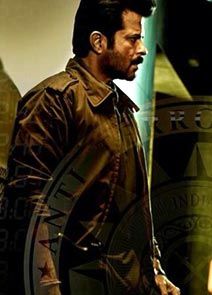 | « Back to article | Print this article |
 The television series that closely resembles the lives of the members of the Nehru-Gandhi family is making waves on prime time, says N Sundaresha Subramanian.
The television series that closely resembles the lives of the members of the Nehru-Gandhi family is making waves on prime time, says N Sundaresha Subramanian.
He is an eligible bachelor who has just won an election and is about to be sworn in as the country's prime minister.
His father was assassinated by a Sri Lankan terrorist organisation.
His widowed mother is pulling all stops to ensure there are no last-minute hitches in the coronation.
His protective sister is busy foiling attempts by detractors to harm her brother.
The sister's husband pursues his own ambitions, though these come in the way of the prime-minister-to-be.
Don't let your imagination run ahead.
This wasn't a description of people and events in the Nehru-Gandhi family.
Though some projected events such as the election win would fit the country's first political family's liking, these are people from a different family; they are the Singhanias of popular TV soap 24, played every Friday and Saturday on Hindi entertainment channel Colors.
According to TAM ratings, the show clocked a TVT (Television viewers in thousands) of 3,134 during its first week -- viewership of about 3.2 million. Producers have claimed the numbers have improved since then, with strong following among the metro audience.
Aditya Singhania is the prime ministerial-designate. And, the Sri Lankan terror organisation that killed his former prime minister father is called LTFE. If that rings a bell, it is for obvious reasons. LTTE, or the Liberation Tigers of Tamil Eelam, the dreaded Tamil organisation, was behind the suicide bomb blast that killed former prime minister Rajiv Gandhi in Sriperumpudur near Chennai in May 1991.
24, set in a 24-hour time frame, revolves around the Singhania family and an ends-will-justify-the-means secret agent played by Anil Kapoor.
In the past, the Indian National Congress and the Nehru-Gandhi family have been very sensitive about the portrayal of their members, especially Rajiv Gandhi, on the silver screen. Kuttrapathirikai (Tamil for charge sheet), a film directed by R K Selvamani, was stuck for 13 years, as the censor board refused to allow a film that was loosely based on the events leading to Rajiv Gandhi's assassination to be released. In March 2007, the film was finally released, albeit with several cuts.
Now, however, things seem to have changed.
"If it was negative, the Congress would have asked for a ban," said a former bureaucrat. Congress spokespersons did not respond to emails seeking comment on the serial.
The storyline and characters of another serial, Nandini, being run on Zee TV, closely resemble the dynasty. "There are a couple of such serials. These are all into shehzada (prince). Initially, I watched a bit. But there was too much violence. So, I stopped (watching)," said a senior Bharatiya Janata Party (BJP) functionary.
As the country gears up for the most fiercely fought general elections in recent memory, are the producers of these serials capitalising on the politically charged atmosphere?
Are the grand old party and the Nehru-Gandhi family capitalising on the pedigree that they often see as a strength, despite criticism of nepotism? After all, in recent campaign speeches, Rahul Gandhi has often referred to his family. Eerily, he even mentioned how he feared he may be assassinated like his father and grandmother.
In 24, Kapoor, playing the chief of an anti-terrorism unit, fights hard to save Singhania from an assassination attempt, which is led by the son of a slain LTFE member.
Analysts concede in the past, television has had an impact. Arun Jethmalani, chief executive of Pune-based research firm Value Notes, says, "Television is a powerful medium. In the late 80s and 90s, Ramayana and Mahabharata had a huge fan following. That was consistent with the period when BJP went from two seats to 89 seats in Parliament. Media is powerful. How they use it and how it is received will be the key."
However, he adds unlike in the late 1980s when television was the foremost form, there are multiple media at work now. Today, social media has its own audience and with the proliferation of channels, the impact of one serial on a single channel may not have the same impact as blockbusters on the only channel had two decades ago. "If the serial is interesting, people will watch. TV viewership is very fragmented. It's a numbers game. How many will watch it? Of that, some people are going to be influenced," Jethmalani said.
(With inputs from Kavita Chowdhury)